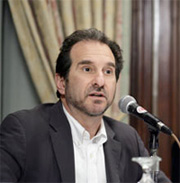Working Families Party Leaps Into ‘Halt the Hike’ Mode
 WFP director Dan Cantor. Photo: Drum Major Institute.
WFP director Dan Cantor. Photo: Drum Major Institute.Yesterday, after bridge tolls were officially ruled dead and before the latest breakdown in MTA rescue talks, the Working Families Party sent out an alert that its "Halt the Hike" campaign is back in full swing. In an email exchange with WFP spokesman Dan Levitan, I asked why, given the big income disparities between car commuters and transit riders, the party waited so long to join the fray. Does the Working Families Party oppose bridge tolls and road pricing? He wrote back:
That’s not the case at all. We don’t have a specific position on tolls per se — but we’re for bailing out the MTA whatever it takes. If it’s got to be tolls, fine. Vehicle registration fees? Fine. Gas tax? Fine. Payroll tax, you get the picture. The important thing, from our view, is that they find a way to halt the hike.
The real reason we’re ramping up? Now that the budget is over, we finally have time to breathe.
Behind the scenes, he said, the party has been more active:
We were working Senate Democrats to support the Silver/Ravitch plan best we could given that we had another huge ask in front of them at the same time — raising taxes on rich people so as to prevent devastating cuts to hospitals, classrooms, homeless shelters, etc.
Because of that effort, the WFP is widely viewed as a driving force behind the state budget currently inching closer to completion. But arguably, there’s no more important pocketbook issue facing a broader swath of New York City working families than fare hikes. Not to mention the dire consequences of leaving millions to rely on an underfunded, declining transit system.
For two years running now, the WFP has been a no-show in
public during a critical debate to fund transit, first via congestion
pricing and then via the Ravitch Plan. The headlines this morning highlighted one of the problems with playing catch-up this time around: Once a few renegade New York City Dems pulled the string on Ravitch, the whole thing began to unravel. How might this story have unfolded differently if the WFP had gotten out in front of the issue and thrown more of its considerable weight behind the plan?